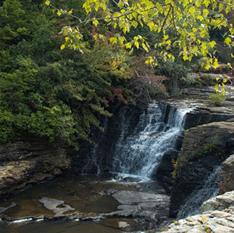In ecology there is such a term - biocenosis. Simply put, it denotes the totality of all living creatures that live in a particular territory, as well as the structure of their relationships. In order to ensure the normal coexistence of different creatures in a biocenosis, a rather complex system of relationships and dependencies is inevitably developed, which forms a natural community. So what is it about? The natural community is the interconnection of elements of animate and inanimate nature in a certain geographical space. Distinguish between natural communities created by nature, and communities that man built - artificial.

In addition to internal interconnections, such as food interconnection, each natural community is closely related to certain conditions of the terrain and climate determined by factors of inanimate nature. In science, a site of inanimate nature associated with a particular biological community is called a biotope. Territories of various scales can be considered as a natural biotope: forest, steppe, desert, and mainland. In any case, the natural community (field, meadow, pond, etc.) of the smaller biotope will be part of the natural community belonging to the larger biotope.
Nutritional relationships are the basic form of relationships in a biocenosis. So-called food chains are built from food relationships . An example of an elementary food chain is: a predator eats a herbivore that eats plants.
Plants inhabiting the natural community in most cases do not eat anyone, they use the
process of photosynthesis directly connected with sunlight as a source of energy. Usually food chains are much more complicated, because, firstly, larger predators can eat smaller ones, so the cat will gladly eat insectivorous tit or predatory pike. Secondly, many animals are relatively omnivorous, such as a bear. Thirdly, you need to understand that food chains are largely closed, since corpses and waste products are processed by a special class of creatures - saprophages, among which fungi and bacteria predominate, and then are consumed by plants from the soil.

But the connections between living organisms inhabiting the natural community are not reduced solely to food, they are much more diverse. One of the most illustrative examples is, of course, the participation of animals and insects in the breeding cycle of many plant species. It is insects in most cases pollinate flowering plants, and animals often take part in the distribution of seeds. Other examples of this symbiosis include the existence of bacteria in the microflora of the animal’s stomach or an anemone that has settled on the carapace of a hermit crab. In most cases, symbiosis is useful to all participants, but even if it is a symbiosis of the parasitic type, when one of the symbionts is harmed, it will be an important part of the natural community as a whole.